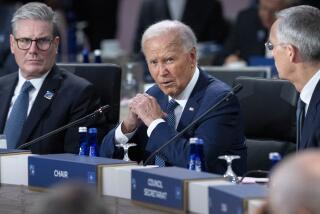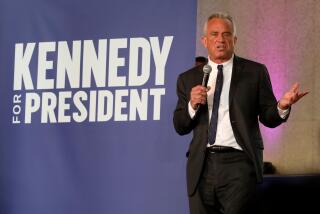Unruffled Dukakis Is Best Evidence to Refute Rumor and Keep Campaign on Track
- Share via
The brief flap over Gov. Michael Dukakis’ medical records should remind us, first of all, that rumors and gossip flourish in an atmosphere of secrecy.
This is hardly new, but it is worth repeating. Dukakis himself may have just learned it for the first time. Defectors from the Soviet Union will tell you that the country is not only one of the most secretive but also one of the most rumor-ridden in the world. It is also true to say that once information is out in the open--whether political or medical or military--it is far less likely to arouse journalistic curiosity, and therefore headlines, than if it is withheld.
The news media now demand to know very much more than they once did, and on the whole the added stock of public knowledge thereby generated surely does more good than harm. Franklin D. Roosevelt was hardly ever photographed in his wheelchair and most Americans apparently did not know that he was crippled. But it is unlikely that either the country or Roosevelt would have been worse off if his polio had been as widely known as President Reagan’s cancer-- provided it had been known from the beginning. A sudden press expose of F.D.R.’s frail state might indeed have weakened national morale in World War II. Better, in other words, to bring these things out as early as possible.
Almost immediately, the Dukakis health-record story turned into a press story. Here it’s hard to avoid suspicion that the media tried to manipulate the episode in such a way as to help the Democratic nominee. Much has been made of the fact that the crucial question at Ronald Reagan’s Wednesday’s press conference--”Do you feel that Michael Dukakis should make his medical records public?”--was asked by a representative of Lyndon LaRouche, routinely characterized as a “political extremist.”
In response to this the Wall Street Journal reasonably noted: “The big press issue is why most establishment watchdogs left a legitimate question to someone from a fringe group.” Was it because they were afraid that Dukakis might really have something to hide and didn’t want to risk embarrassing him and the Democratic Party? One also wonders why, given the legitimacy of the question, that the media was so eager to identify the questioner’s affiliation. This is not normally done after a presidential press conference.
On the night of the press conference, after Reagan had retracted his comment (“Look, I’m not going to pick on an invalid”), CBS political correspondent Bruce Morton managed to turn the tables on the Republicans by citing unidentified sources as telling the television network that Vice President George Bush’s campaign aides had urged reporters to pursue the rumors. Who were these sources? Were they affiliated with Lyndon LaRouche by any chance? Bruce Morton should tell us.
“All three networks prominently cited the involvement of political extremist Lyndon LaRouche in the latest circulation of the rumors, thus presenting them in an especially sleazy light,” according to a Boston Globe story by Ben Bradlee Jr. and Thomas Oliphant. They failed to note that the Boston Globe itself had probably done more than any other publication to start the rumor mill grinding, by reporting a few days earlier: “Rumors that Dukakis suffered a depression for which he had to be treated have been circulating for months. The Globe investigated the rumors and was unable to substantiate them.”
As I say, it would have been better to have preempted all these rumors by full disclosure in the first place.
As for Dukakis himself, it must be said that he has come out of the episode not merely unscathed, but with colors flying. He was magnanimous in downplaying Reagan’s unfortunate quip. Furthermore, Dukakis obviously is stable and mentally equipped to work in the Oval Office. Anyone who can go through the protracted ordeal of the primaries in as unruffled a fashion as he did scarcely needs a doctor to vouch for him.
Finally, one is relieved to note that the Republicans will not be able to take advantage of a setback that would have been potentially serious to the Democrats but irrelevant to the real issues that divide the nation. Conservative Republican Sen. John McCain of Arizona recently told a reporter that “everything about (Bush) and his views is fuzzed up.” This is true, but it would not be helpful to the country if we had a mentally fuzzy picture of the candidates of both parties. If Bush is to recoup his 18-point gap in the public opinion polls, he is going to have to do it on his own, without the unearned assistance of the medical profession.
More to Read
Get the L.A. Times Politics newsletter
Deeply reported insights into legislation, politics and policy from Sacramento, Washington and beyond. In your inbox twice per week.
You may occasionally receive promotional content from the Los Angeles Times.










